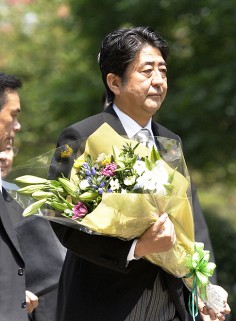Japan's Shinzo Abe omits expression of remorse for wartime aggression
The Japanese prime minister's omission of apologies in annual speech, and visit to war shrine by lawmakers, draw flak from China and South Korea

Japan's conservative prime minister broke with two decades of tradition yesterday by omitting any expression of remorse for the nation's past aggression in Asia in his speech on the anniversary of its second world war surrender.
Shinzo Abe avoided phrases such as "profound remorse" and "sincere mourning", used by his predecessors to acknowledge the suffering caused by the Imperial Japanese Army as it stormed across East Asia - an omission sure to anger China and South Korea.
The hawkish premier has previously expressed unease over Japan's apologies for wartime aggression. The country's neighbours have also bristled at Abe's talk of overhauling the pacifist constitution.
However, Abe stayed away from the controversial Yasukuni war shrine in Tokyo yesterday, sending a ritual offering via an aide. Xinhua, quoting an assistant to Abe, reported that Abe felt regretful that he could not visit the shrine, which is seen overseas as a glorification of Japan's imperialist past, including a brutal 35-year occupation of the Korean peninsula.
Nearly 100 Japanese lawmakers, including three cabinet ministers, did go to the shrine, prompting sharp responses from Beijing and Seoul. China summoned Japan's envoy, and said it was "strongly opposed to and strictly condemned" the shrine visits. It warned relations had no future unless Tokyo owned up to its past.

South Korea's foreign ministry blasted Tokyo for turning a blind eye to Japan's violent aggression during the first half of the 20th century. President Park Geun-hye said it was "hard to build trust without the willingness to face history and consider the wounds inflicted upon others" as she marked the peninsula's liberation from Japan.
The comments did not directly address the speech by Japan's leader, who also dropped a reference to upholding the nation's pledge not to wage war.
"I will never forget the fact that the peace and prosperity we are enjoying now was built based on the sacrifice of your precious lives," the prime minister said in a reference to the 2.5 million war dead honoured at the shrine.
Professor Zhou Yongsheng, a Japanese affairs expert at China Foreign Affairs University, said Abe's remarks were intended to pave the way for Tokyo to revise Japan's constitution to formalise the country's right to have a military.
"This reflects his long-held intention," Zhou said. "His omission of expression of remorse and that Japan would never engage in wars is consistent with his policy directions."
This reflects his long-held intention. His omission of expression of remorse and that Japan would never engage in wars is consistent with his policy directions
Lian Degui, deputy director of the Japanese Studies Centre at the Shanghai Institutes for International Studies, said there was still the possibility of improvement in Sino-Japanese ties because Abe had not visited the Yasukuni shrine.
"There is still a chance that the two nations can get along well with each other," he said. "Abe cannot afford to compromise Japan's international standing and economic interest by having a very poor relationship with China."
Foreign Ministry spokesman Hong Lei said Japan should respect history. "Any visit to the Yasukuni shrine … among Japanese leaders is an attempt to deny or glorify the aggression history of Japan's militarism," Hong said.
"We call on Japan to stick to its pledges to medidate on history, and get the trust of the international community with concrete actions. Otherwise, there is no future for the relationship between Japan and its Asian neighbours."
Japan's Yasukuni shrine, dedicated to the nation's war dead, has been seen elsewhere as a symbol of Japan's past militarism
- Established in 1869 and funded by the government until 1945, the shrine is dedicated to the nation's 2.5 million war dead, including about 1,000 convicted war criminals. No human remains are housed there.
- In wartime the shrine played a central role in the state Shinto religion, which mobilised the population to fight in the name of a divine emperor.
- Among those honoured are 14 second world war leaders convicted by an Allied tribunal as "Class A" war criminals, including prime minister Hideki Tojo. Seven of these were executed by hanging.
- These war criminals were enshrined at Yasukuni in a secret ceremony in 1978.
- A museum in the shrine's grounds depicts the Pacific war as one Japan was forced to fight in self-defence. It has been criticised for ignoring the atrocities Imperial troops committed in Asia.
- About 27,800 men from Taiwan and more than 21,000 Koreans killed while serving with Imperial forces are enshrined at Yasukuni, shrine officials say. Some relatives want their names removed from lists of those honoured there.
- A small shrine dedicated to all who died fighting against Japan, including Chinese and Korean soldiers, was built on Yasukuni's grounds in 1965. There has been at least one attempt to destroy it.
Reuters